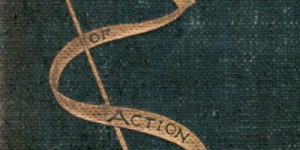The Dualitists by Bram Stoker
The Dualitists Chapter I. Bis Dat Qui Non Cito Dat
The Dualitists Chapter II. Halcyon Days
The Dualitists Chapter III. Rumours of Wars
The Dualitists Chapter IV. The Tucket Sounds
The Dualitists Chapter V. The First Crusade
The Dualitists Chapter VI. ‘Let The Dead Past Bury Its Dead’
The Dualitists Chapter VII. A Cloud With Golden Lining
The Dualitists Chapter IV. The Tucket Sounds
They met in the arbour, determined to discuss this grave question. The heart of each was big with revolution, the head of each was full of scheme and strategy, and the pocket of each was full of sweet-stuff, the sweeter for being stolen. After having dispatched the sweets, the conspirators proceeded to explain their respective views with regard to the enlargement of their artistic operations. Tommy unfolded with much pride a scheme which he had in contemplation of cutting a series of holes in the sounding board of the piano, so as to destroy its musical properties. Harry was in no wise behindhand in his ideas of reform. He had conceived the project of cutting the canvas at the back of his great-grandfather’s portrait, which his father held in high regard among his lares and penates, so that in time when the picture should be moved the skin of paint would be broken, the head fall bodily out from the frame.
At this point of the council a brilliant thought occurred to Tommy. ‘Why should not the enjoyment be doubled, and the musical instruments and family pictures of both establishments be sacrificed on the altar of pleasure?’ This was agreed to nem. con.; and then the meeting adjourned for dinner. When they next met it was evident that there was a screw loose somewhere–that there was ‘something rotten in the state of Denmark’. After a little fencing on both sides, it came out that all the schemes of domestic reform had been foiled by maternal vigilance, and that so sharp had been the reprimand consequent on a partial discovery of the schemes that they would have to be abandoned–till such time, at least, as increased physical strength would allow the reformers to laugh to scorn parental threats and injunctions.
Sadly the two forlorn youths took out their knives and regarded them; sadly, sadly they thought, as erst did Othello, of all the fair chances of honour and triumph and glory gone for ever. They compared knives with almost the fondness of doting parents. There they were–so equal in size and strength and beauty–dimmed by no corrosive rust, tarnished by no stain, and with unbroken edges of the keenness of Saladin’s sword.
So like were the knives that but for the initials scratched in the handles neither boy could have been sure which was his own. After a little while they began mutually to brag of the superior excellence of their respective weapons. Tommy insisted that his was the sharper, Harry asserted that his was the stronger of the two. Hotter and hotter grew the war of words. The tempers of Harry and Tommy got inflamed, and their boyish bosoms glowed with manly thoughts of daring and hate. But there was abroad in that hour a spirit of a bygone age–one that penetrated even to that dim arbour in the grove of Bubb. The world-old scheme of ordeal was whispered by the spirit in the ear of each, and suddenly the tumult was allayed. With one impulse the boys suggested that they should test the quality of their knives by the ordeal of the Hack.
No sooner said than done. Harry held out his knife edge uppermost; and Tommy, grasping his firmly by the handle, brought down the edge of the blade crosswise on Harry’s. The process was then reversed, and Harry became in turn the aggressor. Then they paused and eagerly looked for the result. It was not hard to see; in each knife were two great dents of equal depth; and so it was necessary to renew the contest, and seek a further proof.
What needs it to relate seriatim the details of that direful strife? The sun had long since gone down, and the moon with fair, smiling face had long risen over the roof of Bubb, when, wearied and jaded, Harry and Tommy sought their respective homes. Alas! the splendour of the knives was gone for ever. Ichabod!–Ichabod! the glory had departed and naught remained but two useless wrecks, with keen edges destroyed, and now like unto nothing save the serried hills of Spain.
But though they mourned for their fondly cherished weapons, the hearts of the boys were glad; for the bygone day had opened to their gaze a prospect of pleasure as boundless as the limits of the world.











